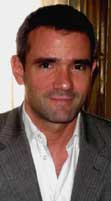 St.
George's Choral Society opens its 194th season on November 20 featuring the
music of Czech Romantic composer Antonín Dvořák with orchestra.
St.
George's Choral Society opens its 194th season on November 20 featuring the
music of Czech Romantic composer Antonín Dvořák with orchestra.
But the music is only part of the story.
The concert promises to be a personal and storied program encompassing not only the history of the Choral Society, the Stuyvesant neighborhood, and its close ties to Dvořák and his protégé Harry Burleigh, but will be presented in the memory of a long-time member whose love of the composer's music and devotion to the choir helped make the concert possible.
Artistic Director and Conductor Dr. Matthew Lewis made some very specific choices when planning the program. "I like a meaty orchestra," he says, "and Dvořák was a master symphonist--huge in scope, intensely dramatic, and with some of the best choral writing." He wanted to challenge the choir, and so decided on Dvořák's Stabat Mater, the composer's reflection on the death of his daughter Josepha. To offer some contrast to the program--and to give some of the more advanced and diligent members of the group a chance to shine--Lewis created a select ensemble to present The Songs of Nature, a collection of poems by Dvořák's countryman Vítězslav Hálek set to music.
The choice of which piece should open the concert, however, was made for him by alto Helen Akst, a long-time member and resident of the Stuyvesant Park neighborhood until her death in 2010.
Dvořák's Te Deum, the first piece in the fall program, had a special place in Helen's heart, but that doesn't surprise Dr. Lewis. "Te Deum features one of the best alto parts in choral music. And it's a festival piece, so it's fun--a real sing! It moves suddenly from full-out vocals to an intense quiet. The notes and rhythms aren't all that difficult, and there's a transparency of textures that really lead it to sing itself. "
Helen loved it so much that she requested the choir perform the piece at her funeral service, and remembered the Choral Society in her estate. But Dr. Lewis wanted to go one further. The scope and majesty of the piece demanded a more thorough preparation than was possible in the short time between her death and burial, so it was decided that the Te Deum would open St. George's Choral Society's fall 2011 season in her memory. "Music had a very profound effect on Helen's life, and it's so wonderful to know that the choir was so important to someone," says Dr. Lewis. "I see a memorial concert as a reflection on a person rather than the mourning of her passing. This music reminds us of what a warm, caring and humorous individual she was."
Dr. Lewis's choice of composers is also a celebration of a small chapter in the 194-year old choir's annals. Antonín Dvořák's brief, but storied history with New York City was spent in the same Stuyvesant neighborhood where Helen Akst spent most of her life. And, like Helen, the composer would find inspiration through St. George's Choral Society.
Dvořák's entrée into the American music scene came courtesy of the commission in 1891 of Te Deum by socialite Jeanette Thurber, who later hired him to direct her National Conservancy of Music--the campus of which was located on East 17th Street in the Stuyvesant Park neighborhood near St. George's Church.
It was there he met Harry Burleigh, a student at the Conservancy and soloist in the oratorio choir at St. George's, the choir that continues today as St. George's Choral Society. Burleigh was, above all, an outstanding musician. A serious, classically trained singer, he would go on to be one of the foremost African-American composers, arrangers and performers whose influences on choral music are of the highest integrity.
But while at the National Conservancy of Music, he was a scholarship student who would do handyman jobs around campus, and would often sing spirituals while going about his work. Dvořák, a devotee of the folk music of his homeland, heard Burleigh's work songs and felt an instant connection. He took the student under his wing, encouraging him to write the spirituals down. It was a mutually beneficial partnership, evident in Dvořák's later works. Elements of the American black spiritual are distinctly recognizable, interplayed with European folksongs.
Throughout the rehearsal process this fall at St. George's Chapel, Dr. Lewis is certain Choral Society members have felt the significance and history of the work. "Music is important to life," he asserts. "I know the choir understands the historic and personal significance of this performance. The Dvořák memorial statue is just on the other side of the street, and for the first time in decades, Helen Akst's voice will not be heard in the voices carried by the fall wind through Stuyvesant Park."
Alisun Armstrong is a copywriter and a soprano living in Queens who loves to bake birthday cakes. You can see some of her non-edible--but award-winning--work at onpage9.com/alisuna/.
